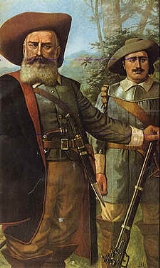
Domingos Jorge Velho
Encyclopedia
Domingos Jorge Velho. was one of the most brutal and effective Portuguese bandeirantes
. He was born to Francisco Jorge Velho and Francisca Gonçalves de Camargo. He was responsible for the repression of several indigenous nations in Bahia
and especially Piauí
, which he is reputed to have been the first colonist to explore. His greater fame, however, is due to his extermination of the Quilombo dos Palmares, in the hinterland of Alagoas
, on behalf of João da Cunha Souto Maior, governor of Pernambuco
. Velho accepted the assignment and, in 1694, with an army of Indians
and mameluco
s, European Native American offspring, overran the fortified city of Macacos, on the Serra da Barriga mountain.
According to the bishop of Olinda at the time, he did not speak Portuguese, only the língua geral
, a Lingua franca
based on Tupian languages
spoken in Brazil at that time, which is false. John Manuel Monteiro, a specialist on the subject, in Os Negros da Terra, explains that Velho not only spoke Portuguese but was indeed literate: "Actually Domingos not only spoke but he also wrote in Portuguese, what would be highly unusual for a Tapuia [...] Domingos even wrote a letter to the Portuguese King, and his recognizable signature can be identified frequently in the civil registries of Santana de Parnaíba". Velho is reputed to have had several Indian concubines. He was married to Izabel Pires de Monteiro: the Captain Salvador Jorge Velho and Simão Jorge Velho were born out of this union.
Bandeirantes
The bandeirantes were composed of Indians , caboclos , and some whites who were the captains of the Bandeiras. Members of the 16th–18th century South American slave-hunting expeditions called bandeiras...
. He was born to Francisco Jorge Velho and Francisca Gonçalves de Camargo. He was responsible for the repression of several indigenous nations in Bahia
Bahia
Bahia is one of the 26 states of Brazil, and is located in the northeastern part of the country on the Atlantic coast. It is the fourth most populous Brazilian state after São Paulo, Minas Gerais and Rio de Janeiro, and the fifth-largest in size...
and especially Piauí
Piauí
Piauí is one of the states of Brazil, located in the northeastern part of the country.Piauí has the shortest coastline of any of the non-landlocked Brazilian states at 66 km , and the capital, Teresina, is the only state capital in the north east to be located inland...
, which he is reputed to have been the first colonist to explore. His greater fame, however, is due to his extermination of the Quilombo dos Palmares, in the hinterland of Alagoas
Alagoas
Alagoas is one of the 27 federative units of Brazil and is situated in the eastern part of the Northeast Region. It borders: Pernambuco ; Sergipe ; Bahia ; and the Atlantic Ocean . It occupies an area of 27,767 km², being slightly larger than Haiti...
, on behalf of João da Cunha Souto Maior, governor of Pernambuco
Pernambuco
Pernambuco is a state of Brazil, located in the Northeast region of the country. To the north are the states of Paraíba and Ceará, to the west is Piauí, to the south are Alagoas and Bahia, and to the east is the Atlantic Ocean. There are about of beaches, some of the most beautiful in the...
. Velho accepted the assignment and, in 1694, with an army of Indians
Indigenous peoples in Brazil
The Indigenous peoples in Brazil comprise a large number of distinct ethnic groups who inhabited the country prior to the European invasion around 1500...
and mameluco
Mameluco
Mameluco the word is believed to be of Arabic origin. The word in Arabic is Mamluk or Mamluka مملوك or مملوكة...
s, European Native American offspring, overran the fortified city of Macacos, on the Serra da Barriga mountain.
According to the bishop of Olinda at the time, he did not speak Portuguese, only the língua geral
Língua Geral
Língua Geral is the name of two distinct linguae francae spoken in Brazil, the língua geral paulista , now extinct; and the língua geral amazônica , whose modern descendant is Nheengatu....
, a Lingua franca
Lingua franca
A lingua franca is a language systematically used to make communication possible between people not sharing a mother tongue, in particular when it is a third language, distinct from both mother tongues.-Characteristics:"Lingua franca" is a functionally defined term, independent of the linguistic...
based on Tupian languages
Tupian languages
The Tupi or Tupian language family comprises some 70 languages spoken in South America, of which the best known are Tupi proper and Guarani.-History, members and classification:...
spoken in Brazil at that time, which is false. John Manuel Monteiro, a specialist on the subject, in Os Negros da Terra, explains that Velho not only spoke Portuguese but was indeed literate: "Actually Domingos not only spoke but he also wrote in Portuguese, what would be highly unusual for a Tapuia [...] Domingos even wrote a letter to the Portuguese King, and his recognizable signature can be identified frequently in the civil registries of Santana de Parnaíba". Velho is reputed to have had several Indian concubines. He was married to Izabel Pires de Monteiro: the Captain Salvador Jorge Velho and Simão Jorge Velho were born out of this union.
Further reading
- Franco, Francisco de Assis Carvalho, "Dicionário de Bandeirantes e Sertanistas do Brasil", Ed. São Paulo University, São Paulo, Ed Itatiaia, Belo Horizonte (1989)

